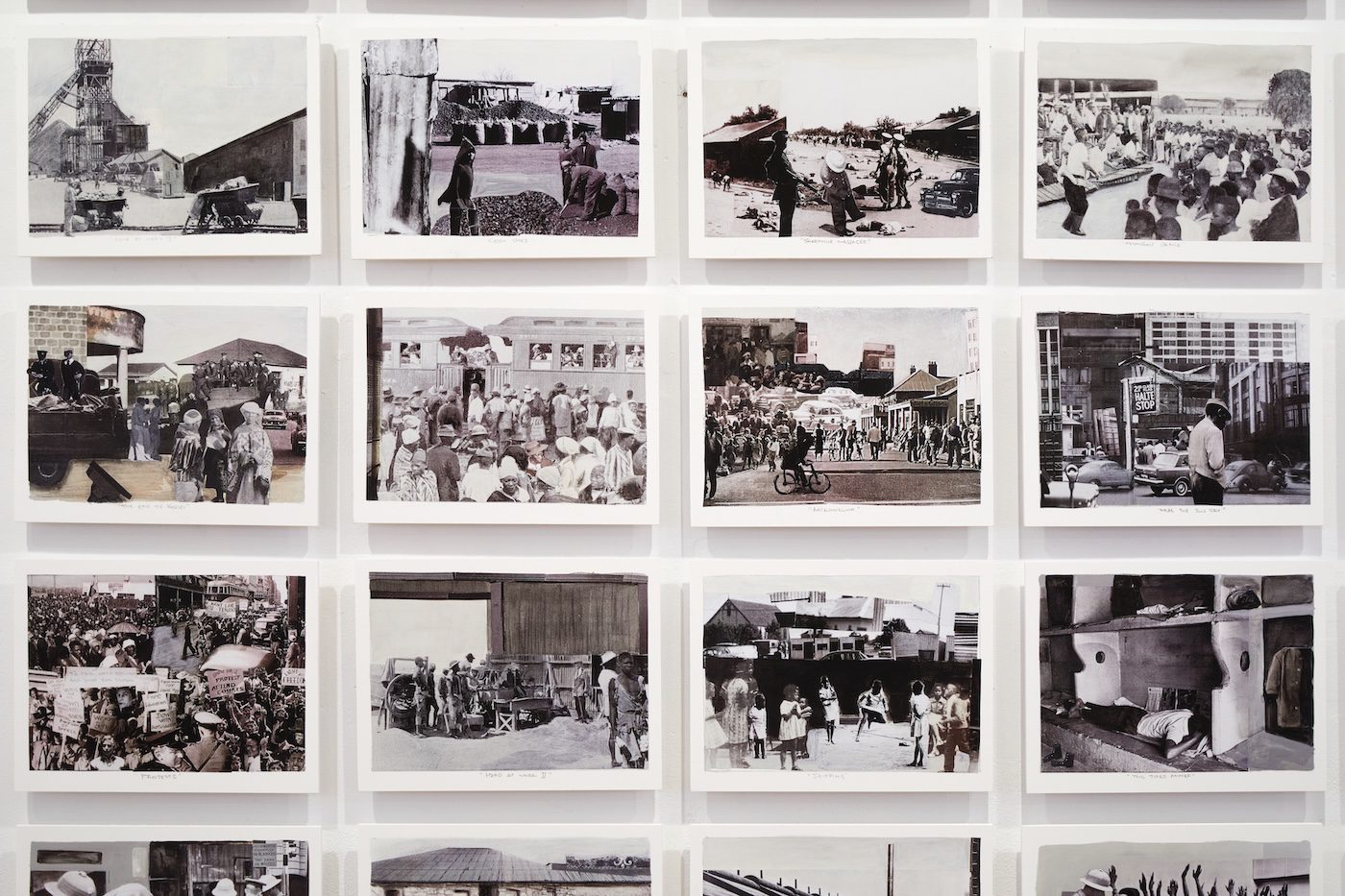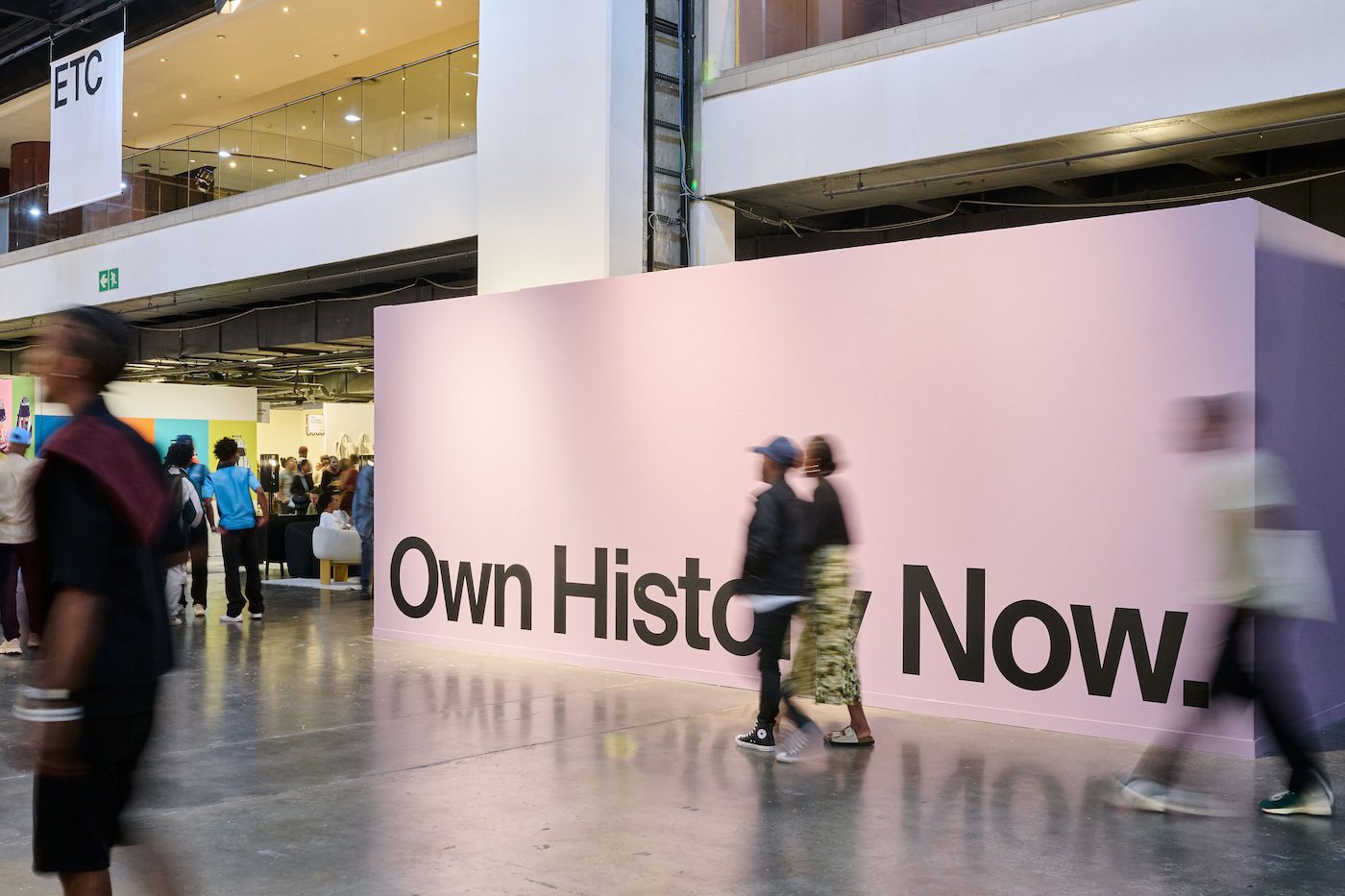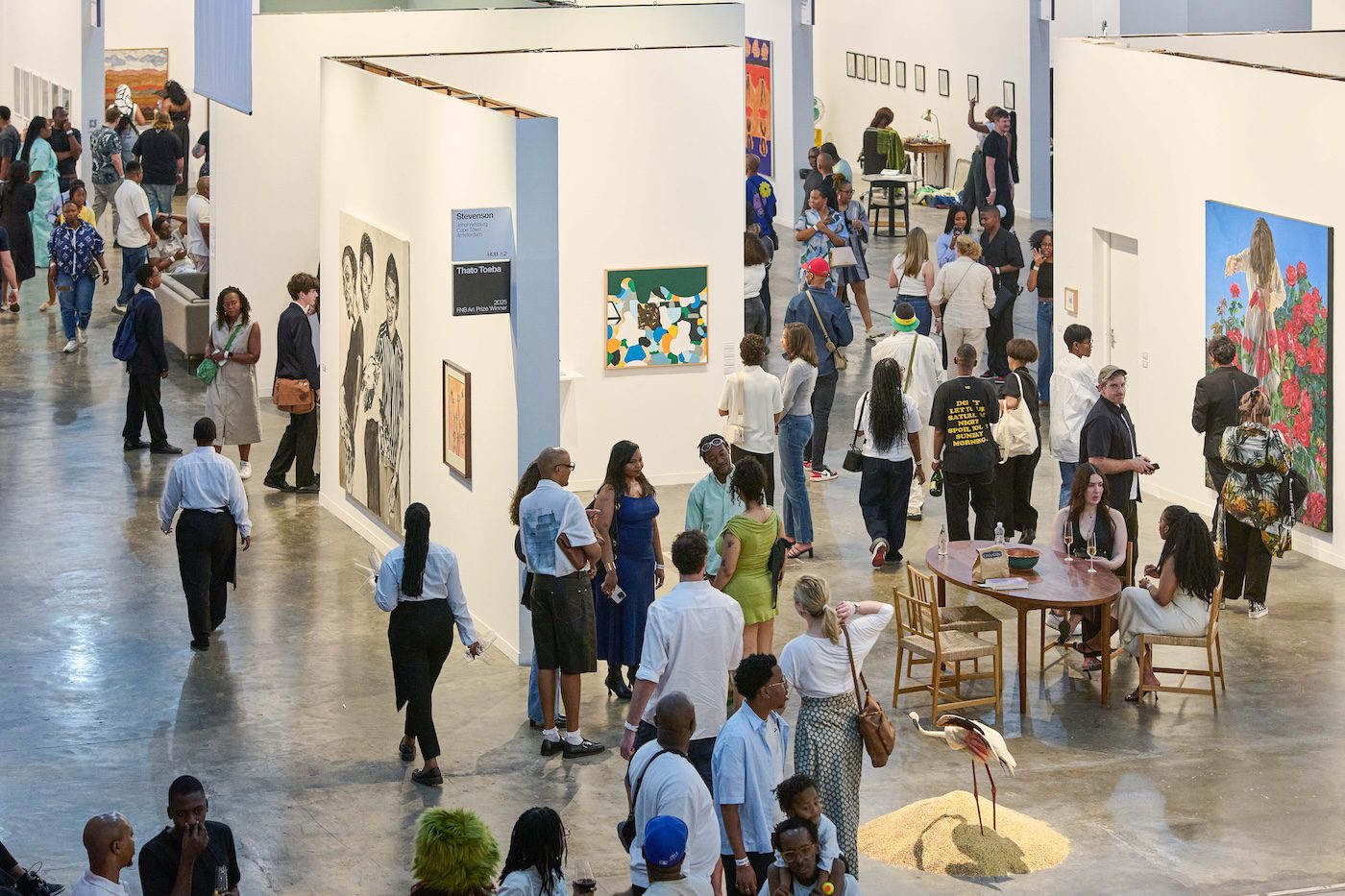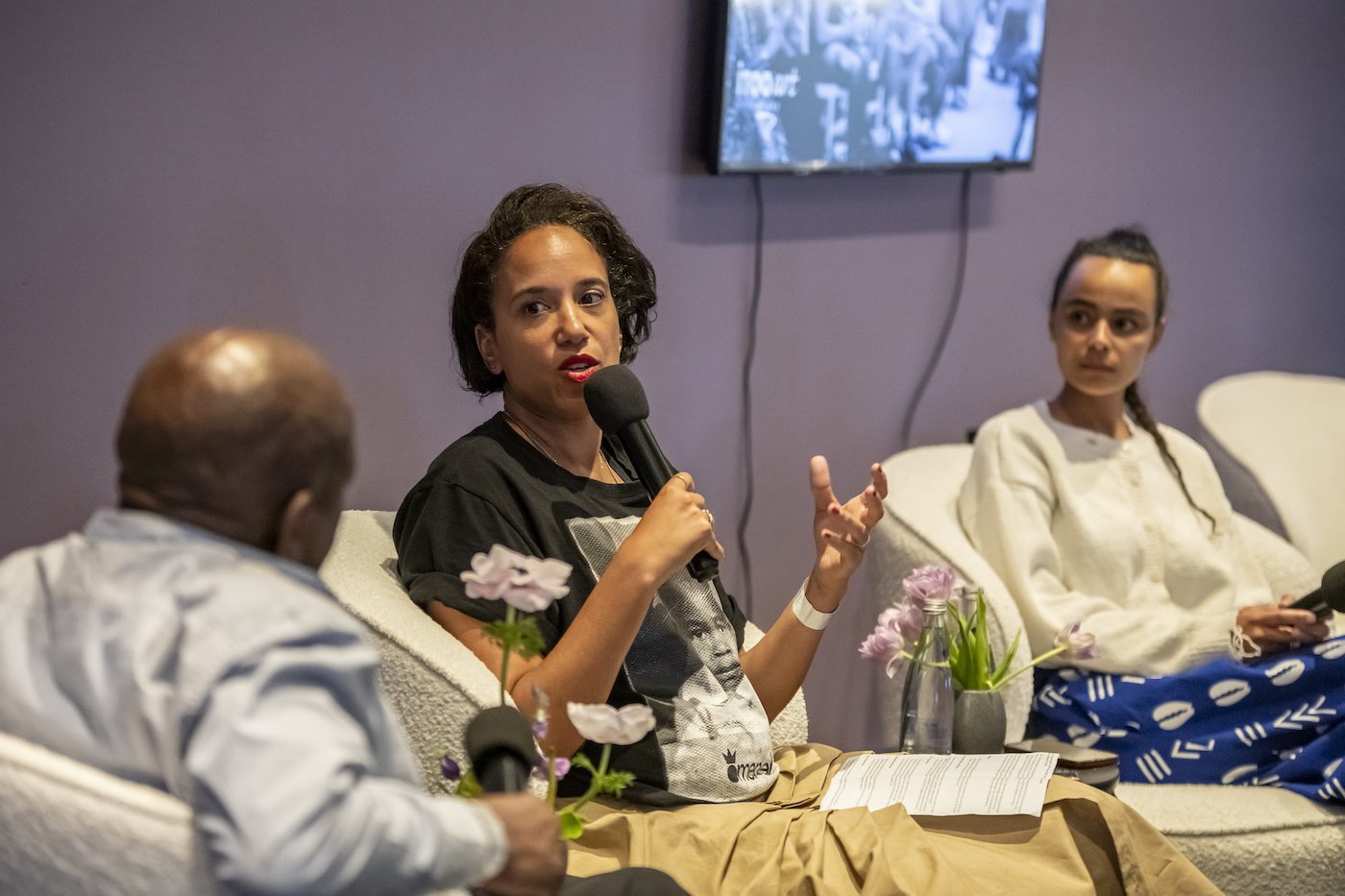As part of the public talks program at FNB Art Joburg, C& curated an intergenerational exchange between artist Sam Nhlengethwa, C& Director Yvette Mutumba, and writer Gillian Fleischmann, titled “The Art of Dialogue: Living Archives, Memory and Practice.” Reflecting on the conversation, Fleischmann argues that intergenerational exchange is a lived embodiment of the medium collage – a generative site of transition.

Sam Nhlengethwa, Glimpses of the Now, 2025. Installation view at Four Corners Gallery. Photo: Josef Konczak
Archives are collections of knowledge through time, with people as habitual agents of its production – whether through oral histories, colonial accounts or otherwise. Often housed in institutions and administered by a few hands, ‘official’ archives are notoriously policed and restricted from active public engagement. The question here is: how can we dismantle decades of systemic convention, facilitate intergenerational conversation, and thus encourage wider engagement with archives?
In Decolonising the Camera: Photography in a Racial Time (2019), Mark Sealy posits visual and photographic archives as a product of modernity – a space created through the selective erasure and suppression of memories. He argues that readings of archival images cannot be static because time continuously mutates their meaning. Engaging with an archive through contemporary discourse makes different interpretations possible and enables new understandings of the context in which it was created.
Many artists have worked critically with colonial archives over the years, and collage has emerged as a particularly compelling medium of re-imagination. It is a medium that finds its autonomy by challenging photography’s conventions and coloniality through the act of cutting and pasting. If photography exists within a single frame of reference, collage disrupts that linearity by allowing different photographic frames to exist in one. Collage is a site of transition between timelines, often in contrast to its source material. This palimpsest disorients, rips and reorientates visual fragments to create new narratives and meaning.

FNB Art Joburg. Photo: Anthea Pokroy.
South African artist Sam Nhlengethwa interrogates sociopolitical histories through the collage-making process. His work with archives hinges on personal interactions that reveal multiple junctures within history, our relation to it, and points of reference that contextualize our positions and the gaps we encounter. A series of thirty colour lithographs titled Glimpses of the 50’s and 60’s (2003) combines the artist’s family photo album with various images by renowned twentieth-century Black photographers, including images from Drum magazine – founded in 1951 to focus on Black urban culture in Johannesburg, publishing photographers such as Ernest Cole, Alf Khumalo, and Peter Magubane. Nhlengethwa’s personal perspective brings about an invitation to dismantle the ‘objective’ narrative of the archive and to confront the institutional conventions behind it. If archives are inherently subjective and curated, shaped by those who create them, Nhlengethwa encourages us to see them not as abstract repositories but as entities that encompass a reflection of lived experience – in doing so, to reject limitations of what can and cannot be archived. As part of a generation of late-twentieth-century South African artists, Nhlengethwa has witnessed great shifts in the country’s political landscape and the world at large. His experience of forms of labour associated with obtaining archival records – whereby the body performs a choreography of institutional regulations – has likewise shifted. However, it remains an ongoing bureaucratic hurdle experienced by artists and art practitioners today. The artist highlights the importance of passing on knowledge to younger generations, in hopes that they would continue to resist.

FNB Art Joburg. Photo: Anthea Pokroy.
If collage can offer a counter-institutional experience through an array of fragmented archives, can we borrow from the medium’s ontology to find ways to engage across generations? I believe that intergenerational knowledge exchange is a lived embodiment of the medium of collage, which resists modernity and linearity. Such exchange occurs between different contexts and positionalities, revealing both ruptures and continuities. It generates varied forms of knowledge and an archive we may not have to constantly renegotiate and work against. Of course, in this process, we must be wary of perpetuating institutional constructs of exclusivity and extraction. By acknowledging the subjective nature of archives, embracing multiple narratives and intergenerational collaboration, we are able to reimagine different forms of archiving to shape our contemporary.

FNB Art Joburg Talk titled “The Art of Dialogue: Living Archives, Memory and Practice.” with Sam Nhlengethwa (left) , C& Director Yvette Mutumba (center), and writer Gillian Fleischmann (right). Photo: Photographer: Anthea Pokroy.
Mark Sealy describes the use of publications, the internet, galleries and museums as spaces that allow the engagement of multiple cultural perspectives into the archive. However, it is important to note that these spaces are not always exempt from the systems they seek to challenge. Certain spaces may introduce permeability to the very power structures that have enabled their existence. While art fairs for instance are temporary, fast-paced spaces intended for buying and selling art, meaning that it would be unsustainable to detach them from their commercial function, I find that the annual Pan-African art fair FNB Art Joburg negotiates both commercial and non-commercial spheres, transcending beyond prescribed parameters. The fair includes participants such as publishers and experimental art spaces, offering a space for an audience wider than art collectors. It is within such diversity that we might realize possible areas of exchange outside the mainstream. And if knowledge is unearthed, regained, and passed on to younger generations, we have grounds to hope for people’s agency beyond commerce and beyond institutions.
Gillian Fleischmann is a South African artist and cultural producer interested in curatorial practice. With a background in fine art photography, she is interested in themes of histories, the archive and their impact on our contemporaries.
ECOLOGIES
C&’s second book "All that it holds. Tout ce qu’elle renferme. Tudo o que ela abarca. Todo lo que ella alberga." is a curated selection of texts representing a plurality of voices on contemporary art from Africa and the global diaspora.
More Editorial